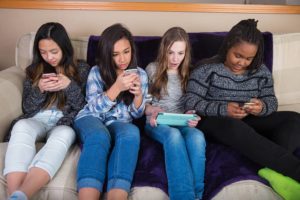Social media use is becoming a mainstay of American life, and the life of our kids, yet research on its effects is at its nascent stage. While there are surely benefits, a recent article by a team of researchers in the UK highlights potential downfalls of time spent on social media. Some governing bodies are considering ways to pressure industry to limit adolescents’ exposure to social media, and there may be implications relevant for our team of clinicians: should clinicians ask about social media use? Should they discuss how social media use make their clients feel? And what should they recommend with respect to time spent on social media?
The paper recently released¹ investigated linkages between social media use and adolescent depression. While other studies have previously found an association between time spent on social media and depression, this analysis focused on the mechanisms by which social media use may be linked with a 14-year-old’s depressive symptoms. Specifically, the researchers were interested in (1) being subjected to online harassment, (2) sleep disturbances (e.g., reduced sleep duration at night when on social media, disruptions from incoming messages, fear of “missing out” when asleep), (3) low self-esteem (e.g., negative feedback on posts and negative comparisons), and (4) poor body image and self-esteem (e.g, comparisons to “idealized beauty” – i.e., photoshoped/edited/doctored/staged pictures).
 The results are quite interesting. First, the researchers found the effect of social media use on depressive symptoms was stronger for girls than for boys. Second, they found support for all four of the mechanisms, but the most important routes were via poor sleep and online harassment. Amount of social media use was directly related to less sleep, taking more time to fall asleep, and sleep disruptions, constructs that were each independently linked with depression. More social media use increased the likelihood of being a victim and perpetrator of online harassment, which were both directly related to depression, but experiencing online harassment (as victim or perpetrator), was also associated with sleep problems, poor body image, and low self-esteem, each of which were associated with depression.
The results are quite interesting. First, the researchers found the effect of social media use on depressive symptoms was stronger for girls than for boys. Second, they found support for all four of the mechanisms, but the most important routes were via poor sleep and online harassment. Amount of social media use was directly related to less sleep, taking more time to fall asleep, and sleep disruptions, constructs that were each independently linked with depression. More social media use increased the likelihood of being a victim and perpetrator of online harassment, which were both directly related to depression, but experiencing online harassment (as victim or perpetrator), was also associated with sleep problems, poor body image, and low self-esteem, each of which were associated with depression.
While there are limits to the study (e.g., reported associations are based on cross-sectional data) and the generalizability of findings to adolescents in the U.S. is unclear, the study does reveal the importance between time kids spend on social media and health outcomes. The findings reveal that it may be important for clinicians to talk to their younger clients, and their parents, about the time they spend on social media and work collaboratively on strategies to mitigate its potentially negative effects.
By Rajeev Ramchand, PhD
CVN Senior Vice President, Research
¹ Kelly, Y., Zilanawala, A., Booker, C., & Sacker, A. (2019). Social media use and adolescent mental health: findings from the UK Millenium Cohort Study. EClinicalMedicine. doi: https://doi.org/10.1016/j.eclinm.2018.12.005.
